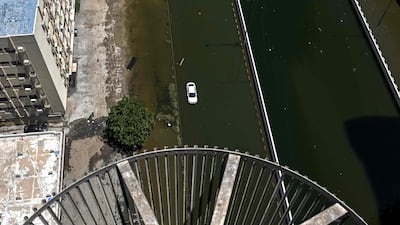Sharjah authorities are assessing the damage caused by the storm earlier this month, focusing on a comprehensive evaluation of infrastructure and public safety.
The storm brought the heaviest rainfall on record, disrupted daily activities and led to a co-ordinated response from various departments across the UAE.
Recovery efforts included clearing flooded areas, assessing road safety and providing support to families in isolated buildings.
Council Chairman
Suggestions for short and long-term solutions were discussed by members of the Sharjah Consultative Council this week.
“We need to deal with natural disasters differently, and during this meeting, we want to come up with unique and different ideas,” said Abdullah Belhaif Al Nuaimi, Council Chairman and former minister of environment and climate change.
“It's important we provide recommendations,” he added.
Ideas suggested by members of the council will be revised and filtered before being presented to decision-makers in the emirate.
Small businesses
Short-term solutions included compensating owners of small businesses that have incurred losses.
“The decision to grant compensation should be amended to include small business owners, not just homeowners,” said Mohamed Al Hammadi, lawyer and member of the council.
Abdel Fattah Mahmoud, owner of Dandana Musical Instruments Establishment, estimated his losses at more than Dh1.7 million. He emphasised the broader economic impact of the compensation suggestion.
“This move would not only help existing businesses but would also boost new investments,” Mr Mahmoud, from Jordan, told The National.
“Now that the water has cleared, we can truly see the extent of the damage.
“Without support, whether financial or otherwise, businesses would not be able to sustain themselves.”
Alternative forms of assistance could be waiving bills and rent for a period to help businesses rebuild, he suggested, adding that neighbouring businesses have also suffered significant losses.
“Such a decision [to compensate small businesses] would provide a sense of safety that will attract more investors to the emirate. They want confidence that in times of crisis, they will not be left to fend for themselves," said Mr Mahmoud.
What about the water?
Further suggestions from council members included setting up large tanks on buildings to collect rainwater.
“These tanks will alleviate pressure on sewage systems and provide water for irrigation and domestic needs,” one member said.
“With over 34,000 buildings in Sharjah, the amount of water collected could be substantial.”
In response to the frequent water flooding on major streets, such as Mohammed bin Zayed Street, Al Ittihad, and Al Wahda, it was suggested to place large plastic basins near problematic areas.
“Equipping these basins with pumps will expedite clearing the water,” another member said.
The meeting also addressed the need for buildings to have power generators to maintain essential services like elevators during power cut.
Other long-term strategies discussed included road rehabilitation, revising construction policies to improve water drainage, and establishing an infrastructure authority.
"There is also a need to collaborate with academic institutions to foster research related to these issues and to involve Sharjah’s Environment and Protected Areas Authority more actively in setting construction standards for new buildings,” suggested another council member.
Proposals also included establishing a field hospital for crises that offers free treatment, setting up more dedicated shelters for displaced families, creating a disaster relief fund with contributions from banks and institutions, and a permanent hotline for crisis situations.
Additionally, increasing the number of emergency response tanks was seen as crucial for managing multiple reports of water accumulation.
Appointing geologists in relevant departments, such as the Department of Public Works, was advised. They would share expert opinions on environmental impacts and safety of new constructions.
Members praised the solidarity shown by the community during the storm and proposed that a body to organise volunteer work during crises is established to ensure comprehensive support for all affected individuals.









